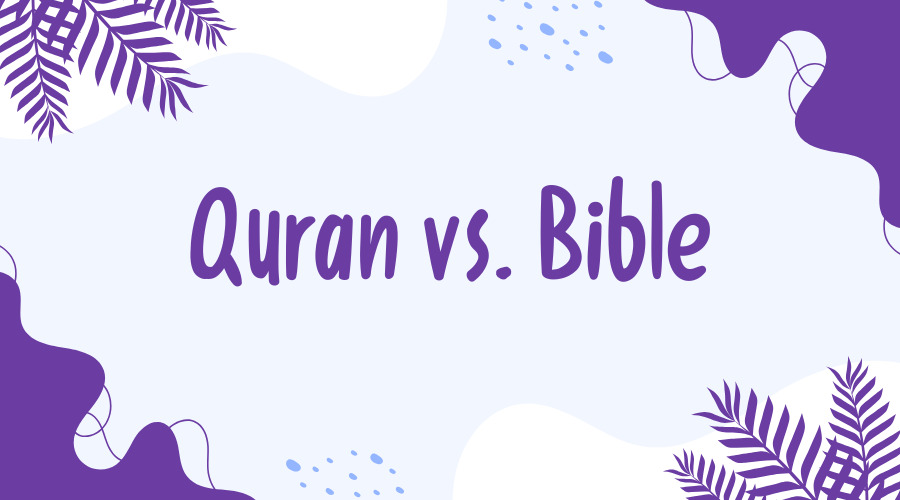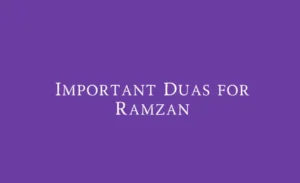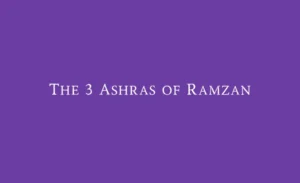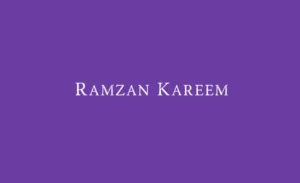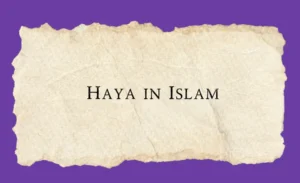The Quran and the Bible are two of the most influential religious scriptures in human history, shaping the beliefs, practices, and cultures of billions of people worldwide. While the Quran is the holy book of Islam, the Bible is revered in Christianity and Judaism (the Old Testament overlaps with Jewish scriptures). Understanding the differences and similarities between these sacred texts not only enhances interfaith dialogue but also allows us to appreciate the divine guidance preserved through revelation.
Keep reading this article, as it provides a detailed comparison of the Quran and the Bible, referencing key Quranic verses (Ayats) and Hadiths in Arabic, transliteration, and English translation.
The Origin of Revelation
The origin of revelation marks the foundation of both scriptures. Muslims believe the Quran was revealed directly from Allah to Prophet Muhammad ﷺ through Angel Jibreel, preserved without alteration. In contrast, the Bible is viewed by Christians as divinely inspired writings compiled over centuries by prophets and apostles.
Quran
The Quran is believed by Muslims to be the direct word of Allah, revealed to Prophet Muhammad ﷺ over 23 years.
Arabic: إِنَّا نَحْنُ نَزَّلْنَا الذِّكْرَ وَإِنَّا لَهُ لَحَافِظُونَ
Transliteration: Innā naḥnu nazzalnā al-dhik’ra wa-innā lahu laḥāfiẓūn.
Translation: “Indeed, it is We who sent down the Qur’an and indeed, We will be its guardian.” (Surah Al-Hijr 15:9)
Muslims firmly believe that the Quran is the literal word of Allah, revealed to Prophet Muhammad ﷺ gradually over 23 years. Unlike other scriptures, Allah Himself promises to protect the Quran from alteration, ensuring its authenticity for all generations.
Bible
Christians believe the Bible was divinely inspired and written by multiple prophets and apostles over centuries. The Old Testament represents the Hebrew scriptures, while the New Testament details the life and teachings of Jesus (ʿĪsā عليه السلام in Islam).
2 Timothy 3:16 – “All Scripture is inspired by God and is useful to teach us what is true and to make us realize what is wrong in our lives.”
Language and Preservation
The Quran was revealed in Classical Arabic and has remained unchanged since its revelation, recited and memorized worldwide in its original language. The Bible, however, was originally revealed in Hebrew, Aramaic, and Greek, and later translated into thousands of languages. Over time, variations in manuscripts and translations have led to textual differences, unlike the Quran’s word-for-word preservation.
Quran: Revealed in Classical Arabic, preserved word-for-word without alteration since its revelation. Muslims around the world recite it in Arabic.
Bible: Originally revealed in Hebrew, Aramaic, and Greek, translated into thousands of languages. Over time, textual variations and manuscript differences emerged.
Hadith (Sahih Bukhari): “Do not write down anything from me except the Qur’an. Whoever writes other than that should erase it.” (Bukhari 111)
This emphasizes the preservation of the Quran as distinct from other sayings
Central Message
The central message of the Quran is the oneness of Allah (Tawheed), guidance for righteous living, and the finality of Prophethood in Muhammad ﷺ. The Bible’s core message centers on God’s covenant with humanity and the salvation offered through Jesus Christ. While both emphasize faith, morality, and devotion to God, their theological interpretations differ significantly.
Quran: The oneness of Allah (Tawheed), guidance for humanity, laws for righteous living, and finality of Prophethood in Muhammad ﷺ.
Bible: God’s covenant with His people, the role of prophets, and the salvation message of Jesus as the Son of God (Christian belief).
Quran on Jesus:
In the Quran, Jesus (ʿĪsā عليه السلام) is honored as a revered Prophet and Messenger of Allah, born miraculously to Maryam (Mary). However, the Quran clarifies that he was neither crucified nor divine, but rather a servant of Allah who called people to worship the One God.
Arabic: وَقَوْلِهِمْ إِنَّا قَتَلْنَا ٱلْمَسِيحَ عِيسَى ٱبْنَ مَرْيَمَ رَسُولَ ٱللَّهِ وَمَا قَتَلُوهُ وَمَا صَلَبُوهُ وَلَٰكِن شُبِّهَ لَهُمْ
Transliteration: Wa qawlihim inna qatalna al-maseeha ‘Eesa ibna Maryama rasoola Allahi wama qataloohu wama salaboohu walakin shubbiha lahum.
Translation: “And [for] their saying, ‘Indeed, we have killed the Messiah, Jesus, the son of Mary, the Messenger of Allah.’ And they did not kill him, nor did they crucify him; but [another] was made to resemble him to them.” (Surah An-Nisa 4:157)
Structure
The Quran is composed of 114 chapters (Surahs) of varying lengths, each consisting of verses (Ayahs), and it is recited in Arabic across the world. The Bible, on the other hand, is a collection of books; 66 in the Protestant tradition and 73 in the Catholic, divided into the Old Testament and New Testament, written over centuries by multiple authors.
Quran: 114 chapters (Surahs), arranged mostly by length, each beginning with Bismillah except Surah At-Tawbah.
Bible: 66 books (Protestant), 73 (Catholic), divided into Old Testament and New Testament.
Concept of God
The Quran emphasizes absolute monotheism, declaring Allah as One, eternal, and without partners, children, or equals. In contrast, the Bible also teaches belief in one God but introduces the concept of the Trinity in Christianity: the Father, the Son, and the Holy Spirit, reflecting a theological difference in understanding God’s nature.
Quran
The Quran states that Allah is One, eternal, without partners.
Arabic: قُلْ هُوَ ٱللَّهُ أَحَدٌ ٱللَّهُ ٱلصَّمَدُ لَمْ يَلِدْ وَلَمْ يُولَدْ وَلَمْ يَكُن لَّهُۥ كُفُوًا أَحَدٌ
Transliteration: Qul huwa Allahu ahad. Allahu as-samad. Lam yalid walam yoolad. Walam yakun lahu kufuwan ahad.
Translation: “Say, He is Allah, [who is] One. Allah, the Eternal Refuge. He neither begets nor is born, nor is there to Him any equivalent.” (Surah Al-Ikhlas 112:1-4)
Bible
The Bible also states that God is One but revealed as the Trinity (Father, Son, and Holy Spirit) in Christian theology.
John 10:30 – “I and the Father are one.”
Prophets and Messengers
The Quran highlights 25 prophets, from Adam to Muhammad ﷺ, all sent with the same core message of worshiping one God. The Bible also features many of these figures, with Jesus as the central figure in Christianity, while Islam regards Muhammad ﷺ as the final Prophet. Both scriptures affirm prophets as guides.
Quran: Mentions 25 prophets, including Adam, Noah, Abraham, Moses, Jesus, and Muhammad ﷺ as the final Prophet.
Bible: Mentions prophets and apostles, with Jesus as the central figure of salvation.
The Quran mentions: وَمَا أَرْسَلْنَاكَ إِلَّا رَحْمَةً لِّلْعَالَمِينَ
Transliteration: Wa ma arsalnaka illa rahmatan lil’alameen.
Translation: “And We have not sent you, [O Muhammad], except as a mercy to the worlds.” (Surah Al-Anbiya 21:107)
Similar Teachings
Here is a list of some similar teaching in both Quran and Bible:
- Belief in One God (though interpreted differently).
- Importance of prayer, charity, fasting, and moral conduct.
- Stories of prophets like Noah (Nuh), Abraham (Ibrahim), and Moses (Musa).
- Emphasis on the Day of Judgment and eternal life.
The Quran mentions: فَمَن يَعْمَلْ مِثْقَالَ ذَرَّةٍ خَيْرًا يَرَهُۥ وَمَن يَعْمَلْ مِثْقَالَ ذَرَّةٍ شَرًّا يَرَهُۥ
Transliteration: Faman ya‘mal mithqala dharratin khayran yarah. Waman ya‘mal mithqala dharratin sharran yarah.
Translation: “So whoever does an atom’s weight of good will see it, and whoever does an atom’s weight of evil will see it.” (Surah Az-Zalzalah 99:7-8)
Major Differences
While both the Quran and the Bible share core moral values and narratives, they differ in theology, preservation, and approach to salvation. The following table highlights some of the key differences between the two scriptures for easier comparison.
| Major Differences (Comparison Table) | ||
| Aspect | Quran | Bible |
| View of Jesus (ʿĪsā) | Prophet and Messenger | Son of God, Savior |
| Salvation | Through faith, good deeds, and Allah’s mercy | Through belief in Jesus’ sacrifice and resurrection |
| Textual Integrity | Preserved without change | Multiple versions and translations |
| Law | Contains detailed legal rulings (Shariah) | Emphasizes grace and faith (Christianity) |
Final Reflections on the Quran and the Bible
The Quran and the Bible are sacred scriptures that share common ground in monotheism, prophetic teachings, and moral values but diverge significantly in their theology, preservation, and message of salvation. Muslims honor the Torah and Gospel as earlier revelations but believe the Quran is the final, unaltered guidance for mankind. Understanding these similarities and differences is crucial for building interfaith harmony, appreciating religious diversity, and seeking truth in divine revelation.
An important reminder from Quran:
Arabic: قُلْ يَا أَهْلَ ٱلْكِتَـٰبِ تَعَالَوْا۟ إِلَىٰ كَلِمَةٍۢ سَوَآءٍۢ بَيْنَنَا وَبَيْنَكُمْ أَلَّا نَعْبُدَ إِلَّا ٱللَّهَ
Transliteration: Qul ya ahla alkitabi ta‘alaw ila kalimatin sawa’in baynana wabaynakum alla na‘buda illa Allah.
Translation: “Say, O People of the Scripture, come to a word that is equitable between us and you – that we will not worship except Allah.” (Surah Aal-e-Imran 3:64)

